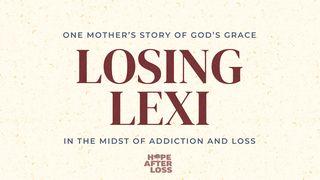Matthew 5-7: The Way of the KingdomSample

A Warning About Anger
By Rob Nieminen
“You have heard that it was said to the people long ago, ‘You shall not murder, and anyone who murders will be subject to judgment.’ But I tell you that anyone who is angry with a brother or sister will be subject to judgment. Again, anyone who says to a brother or sister, ‘Raca,’ is answerable to the court. And anyone who says, ‘You fool!’ will be in danger of the fire of hell. Therefore, if you are offering your gift at the altar and there remember that your brother or sister has something against you, leave your gift there in front of the altar. First go and be reconciled to them; then come and offer your gift. Settle matters quickly with your adversary who is taking you to court. Do it while you are still together on the way, or your adversary may hand you over to the judge, and the judge may hand you over to the officer, and you may be thrown into prison. Truly I tell you, you will not get out until you have paid the last penny.”—Matthew 5:21–26 (NIV)
As we’re working our way through the Sermon on the Mount, we’ve come to a critical point. Prior to this, Jesus shared what’s known as the Beatitudes, teachings that reveal how we’re blessed by God and that challenged the teachings of the Pharisees and experts of the Law.
Here, Jesus begins issuing a series of six warnings to His followers that confronts how people interpreted the Law of Moses they lived by. He starts with the sixth commandment against murder, which is interesting because by highlighting it first, He’s underscoring just how critical it really is.
Why did He start with murder? Because Jesus understood that murder isn’t just about crossing a line by taking someone’s life; it begins much sooner in the heart with anger. According to Randy A. Martinez, lead pastor at MAPS Global church in Richmond, Virginia, from Jesus’ vantage point, “Unresolved anger is the most common and pervasive issue in the human race. It’s our biggest problem . . . Murder in seed form is unresolved anger.”
But if we’re honest, anger is one of the sins we as Christians aren’t very concerned about. Sure, we lose our temper from time to time, but we’re just blowing off steam, right? What’s the big deal?
If that’s our mindset, then we’re in for an attitude adjustment, because Jesus is correcting some serious misinterpretations of the sixth commandment here (which He gave to Moses at Mount Sinai, by the way!). That’s why He can speak with authority and say, “You have heard that it was said . . . but I tell you . . .”
Jesus isn’t abolishing the law prohibiting murder. Rather, He’s clarifying its meaning and expanding it to include unresolved anger because He knows it will ultimately lead us down the path to murder and destruction. The problem isn’t the law; the problem is that people reduced it to an external act rather than an issue of the heart.
You might be thinking, Yeah, but I’m not guilty of murdering or physically hurting anyone. That may be true, but Jesus addressed that assumption, too, noting that if we attack someone with our words, we’re just as guilty as if we planned to harm them physically. Let that sink in for a moment.
How many times have you uttered curses at another person (even under your breath) or posted toxic comments on someone’s social media post who you disagree with? Jesus is so serious about this that He tells us to postpone our worship and offerings if we know there’s unresolved anger between us and a brother or sister. He would rather we leave our offering at the altar and seek reconciliation before we show up at church. James, the brother of Jesus, put it this way: “My dear brothers and sisters, take note of this: Everyone should be quick to listen, slow to speak and slow to become angry, because human anger does not produce the righteousness that God desires” (James 1:19–20 NIV).
So, what do we do if we’re harboring unresolved anger? We heed Jesus’ kind and compassionate warning, and we bring it to Him with complete honesty, we ask His forgiveness and for His love to pour into us, and we seek reconciliation with those we’ve hurt with our words and actions. When we do, we become like those who He declared are blessed in the Beatitudes.
Pause: Take a moment to do a heart check with the Holy Spirit about anger. Do you have any unresolved anger toward a person or a situation or a conflict you need to resolve with someone?
Practice: Meditate on passages of Scripture that speak to the nature of anger and how we should deal with it (Proverbs 15:1, 19:11; Ephesians 4:26–31; Psalm 37:8–9; 1 Corinthians 13:4–8). Invite the Holy Spirit to guide you in the process of uprooting anger from your heart and the steps you need to take to reconcile with others.
Pray: Jesus, thank You for Your Word and Your kind warnings to us about things that can destroy us, like anger. I confess my unresolved anger to You and ask You to help me uproot this sin from my heart. Grant me Your love and peace, and help me to reconcile with those whom I’ve harmed by my words or actions—or even to forgive those who have harmed me with theirs. Amen.
About this Plan

In part two of our Matthew devotional, we'll explore Matthew 5-7, where we find Jesus' most famous message, the Sermon on the Mount. Learn where real happiness comes from through the Beatitudes, and discover what true kingdom living looks like.
More
We would like to thank Calvary Chapel Ft. Lauderdale for providing this plan. For more information, please visit: https://resources.calvaryftl.org
Related Plans

I'm Just a Guy: Raising Kids

God Hears Every Prayer

God Gives Good Gifts to Everyone

I’m Just a Guy: With Anxiety

I’m Just a Guy: Wrestling With Money

Losing Lexi: One Mother's Story of Grace in the Midst of Addiction and Loss

The DEEP Method: How to Discover, Explore, Engage, Practice God's Word

Strength for Singles - Lessons From Sampson

When God Says No!
